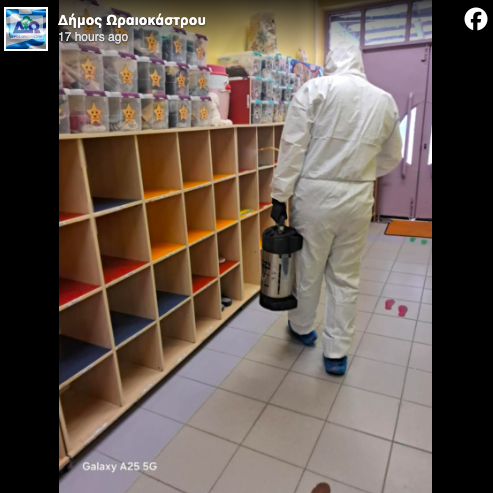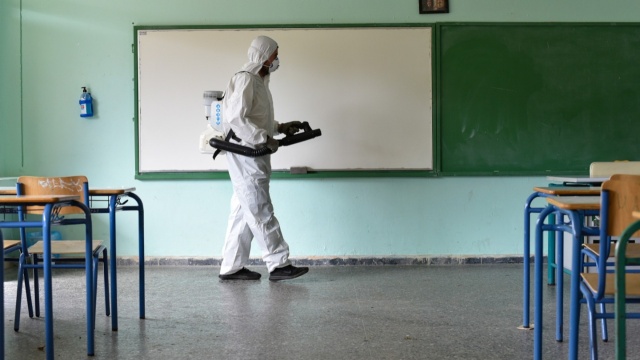The Hellenic National Public Health Organization (EODY) is opposing the decisions of local authorities in Attica, Thessaloniki, Serres, and Crete to close schools due to reported streptococcus cases. EODY President Christos Chatzichristodoulou stated that these measures are unnecessary and could potentially pose more risks.

EODY’s Position: No Need for School Closures
“While it’s understandable that municipalities and parents prioritize children’s safety, closing schools or disinfecting them due to streptococcus is counterproductive and may heighten risks,” Chatzichristodoulou remarked in an interview with Greek public broadcaster ERT. “We urge everyone to halt school closures and disinfection efforts, as these measures are not effective.”
Tentative School Closures Continue
Despite EODY’s advice, numerous schools in Greece have temporarily shut down:
- Athens: The Municipality of Vyronas has closed the 1st and 5th kindergartens on Monday due to several strep cases.
- Thessaloniki: The 2nd Primary School and 9th Kindergarten of Kalamaria closed following a student’s confirmed infection, with full disinfection enacted.
- Oraiokastro: A confirmed case at the 6th Kindergarten warranted precautionary cleaning, with a reopening planned for the next day.
- Crete: The Kastelli Kindergarten in the Municipality of Minoa Pediada closed after three students tested positive. Mayor Vasilis Kegeroglou stressed that symptomatic or positive-testing children should see a pediatrician. A similar closure happened at the 2nd Kindergarten of Atsipopoulo in Rethymno.
- Serres: The municipality closed several institutions, including the 4th, 17th, 8th, and 25th Primary Schools, due to confirmed group A strep infections, coordinating preventive cleaning with EODY and educational leaders.
Recommended Actions
EODY has suggested the following:
- Children diagnosed with strep should stay home for at least 24 hours after starting antibiotics to cease being contagious.
- Schools should emphasize enhanced hygiene practices:
- Regular hand washing
- Avoiding sharing personal items (e.g., water bottles)
- Increasing classroom cleanliness
Understanding Streptococcal Infections
EODY monitors invasive forms of group A streptococcus, which have risen in Europe post-COVID. Greece reported:
- 90 cases in 2023
- 68 cases in 2024
- 24 cases by May 22, 2025
The mortality rate for invasive infections stands at around 25%, translating to one in four affected individuals. However, most cases are mild and non-invasive.
Signs for Concern
In severe situations, a child may appear extremely weak, often beginning with a sore throat and high fever. Seek immediate medical attention if a child exhibits:
- Persistent fever
- Intense throat pain
- Difficulty swallowing
- Fever accompanied by a rash
- Marked fatigue
What is Group A Streptococcus?
Group A Streptococcus (GAS), known scientifically as Streptococcus pyogenes, is a widespread bacterium responsible for both mild and serious infections. While not regularly tracked through mandatory disease reporting in Greece, EODY has requested healthcare services to report confirmed cases in light of rising occurrences in the UK and Europe.
Some people may carry the bacterium asymptomatically in their throat or skin.
Transmission Pathways
GAS spreads via:
- Respiratory droplets from coughing or sneezing
- Contaminated surfaces
- Contact with infected wounds
- Close interactions with sick individuals
Transmission is more likely from individuals displaying symptoms rather than asymptomatic carriers.
Who Is Most Vulnerable?
While anyone can contract an infection, high-risk populations include:
- Young children
- Elderly individuals
- Immunocompromised patients
- People with chronic health issues
- Individuals in crowded or unhygienic settings
GAS is a leading cause of pharyngotonsillitis among school-aged children.
Vaccine Status
Currently, there is no vaccine available for group A streptococcus, although several candidates are in development.
Treatment Approaches
Prompt treatment with the appropriate antibiotics is crucial, especially for severe cases.
EODY advocates for calm and evidence-based approaches in response to strep cases. Rather than resorting to school closures or extensive disinfecting, efforts should prioritize hygiene practices, timely treatment, and vigilance for serious symptoms.
Ask me anything
Explore related questions

















